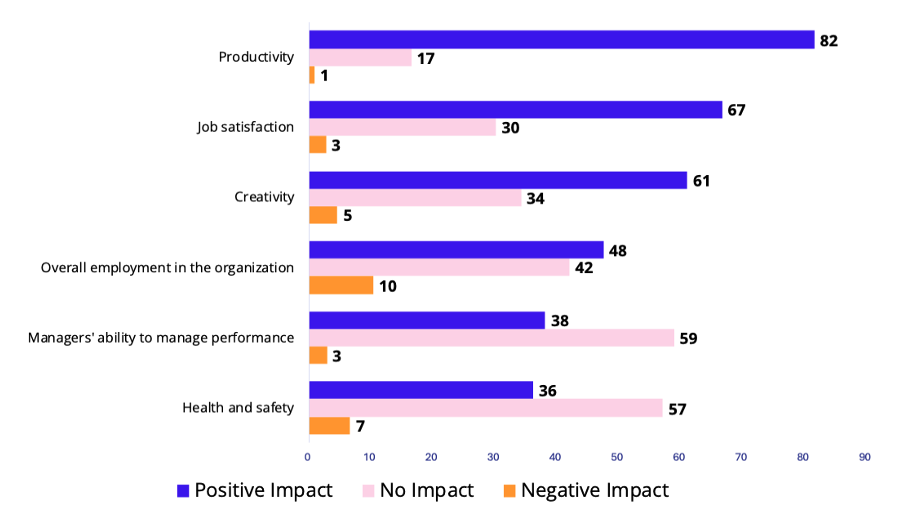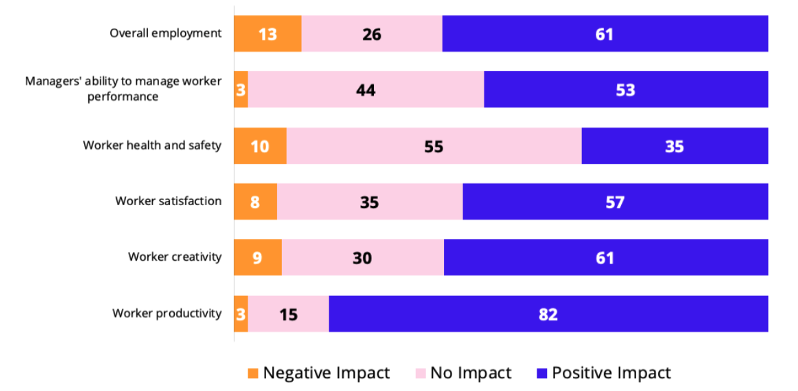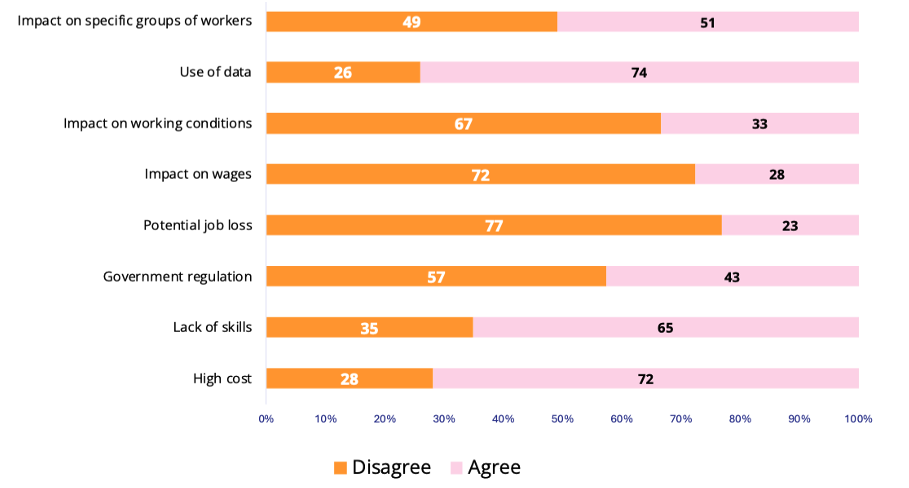Human and technology: two perspectives on the future of work
Perceptions of Advanced Digital Technologies (ADTs), such as artificial intelligence, cloud computing etc., and their impact on skills differ significantly between employees and managers, as highlighted by our survey report. While both groups acknowledge the increasing importance of human skills and the high demand for both human and digital skills, their views diverge on the direct impact of ADTs, the extent of skill shortages, training provision, and skill prioritization in evolving work settings.
How employees and managers assess ADTs’ impact
Employees tend to view ADTs through the lens of their immediate work experience, and they report a stronger and more positive impact of ADTs’ on their daily work. While managers adopt a broader organisational perspective.
- Employees report strong benefits from ADT adoption, highlighting improvements in productivity (82%), job satisfaction (67%), and creativity (61%). They also perceive ADTs as improving the speed (62% to a great extent) and quality (47% to a great extent) of their work. Furthermore, 67% of employees report doing new or different tasks and 84% doing tasks faster due to ADTs.

- Managers, by contrast, report a lower composite score of 50%. While they also see positive impacts on worker productivity (82%), creativity (61%), and satisfaction (57%), their perception is more cautious and focused on firm-level metrics. Managers generally recognize that ADTs have altered skill requirements (75%) in their companies, leading to demands for data analysis, AI literacy, and meta-skills like adaptability.

The skills debate
Employees and managers agree on which skills matter most, but their assessments diverge in key areas:
- Employees identify problem-solving and creativity skills (87%) and advanced digital skills (86%) as most important for their future work, with interpersonal skills also ranking high (78%). They view basic digital skills as less of a differentiator (44%).
- Managers place high strategic value on future skillsets (77%) for recruitment. They consider problem-solving and creativity (95%), interpersonal skills (97%), and basic digital skills (97%) as critical for recruitment, with advanced digital skills (68%) receiving substantial but lower support.
A notable gap arises in perceived skill shortages: managers report significant gaps in problem-solving (75%), interpersonal (65%), and advanced digital skills (72%) among job candidates; in contrast, employees tend to rate themselves more positively in these areas, indicating a perception gap between self-assessment and external assessment.
Training provision: perception vs implementation
Training provision emerges as an area where perceptions diverge. Only about half of employees view their company’s digital-skills training as extensive, with human-skills training viewed as even less developed. In contrast, managers indicate that more than 70% of organisations provide structured learning programmes (courses, seminars or coaching), and 81% plan to increase investment in digital-skills training. This difference suggests an implementation gap between what managers believe is being offered and what employees experience in practice, underscoring the need for closer alignment in training design and delivery.
Which skills matter most in flexible work settings?
Perceptions also differ regarding which skills take precedence in hybrid or remote work settings. 60% of employees believe that human skills are more essential than digital skills in such environments. Managers, however, take a more technology-centred stance, with 74% believing that digital skills hold greater weight for maintaining performance and collaboration in distributed work models.
Barriers to adoption and readiness to embrace ADTs
Employees express strong enthusiasm to learn new technologies (96%), but cite barriers such as high cost (72%), lack of skills (65%), and concerns over data use (74%). Managers, while more cautious, focus on tangible skill gaps and organisational readiness rather than enthusiasm levels, which reveals a disconnect between self-perception and external assessment.

Aligning employee and manager perspectives for future growth
The findings reveal a shared recognition of the importance of human and digital skills but highlight gaps in perception regarding the scale of impact, training provision, and future skill priorities. Bridging these gaps will require closer alignment between employee experiences and managerial strategies to ensure that technology adoption enhances both individual performance and organisational resilience.
